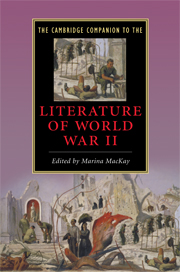1 - War poetry in Britain
from Part I - Anglo-American texts and contexts
Published online by Cambridge University Press: 28 May 2009
Summary
The Second World War is now recognized as a watershed for British poetry, breaking the dominance of high modernist orthodoxies (signaled by the death of Yeats), transforming the openly political poetics of the Auden group into a war poetry of symptom and reportage (inaugurated by the emigration of Auden and Isherwood to the US), releasing a contained and self-censored British surrealism in the form of the New Apocalypse, and seeing the redefinition of formal genres such as the religious ode, sonnet sequence, elegy, and ballad within a range of new registers, from Rilkean-Jungian (Sidney Keyes) to psychoanalytic-demotic (G. S. Fraser). The changes were masked for some time by the enormous power and shock of the conflict itself, and by the restrictions on poetry publishing consequent on paper rationing and the general business of wartime. The Ministry of Supply cut quotas to publishers down a third by 1943, their Paper Control stipulating page limits, words per page, and minimizing unnecessary design. Literary periodicals suffered badly under the new regime, including the closure of Geoffrey Grigson's New Verse and T. S. Eliot's Criterion. In those that remained, it became something of a cliché to run “Where are the War Poets?” featurettes, especially in the protracted silly season of the Phoney War, with dispiriting results, especially when real poets responded to the challenge. Stephen Spender and Alun Lewis signed a manifesto published in Horizon in 1941 asking the government to employ war writers, since “[writers'] propaganda was deeper, more humanly appealing and more imaginative than newspaper men had space or time for.” Cecil Day Lewis went further and, agreeing to disavow communism, became specialist editor in the Publications Division of the Ministry of Information.
- Type
- Chapter
- Information
- Publisher: Cambridge University PressPrint publication year: 2009
- 1
- Cited by



